一般将来时pep 六年级下册英语2
- 格式:ppt
- 大小:234.50 KB
- 文档页数:10
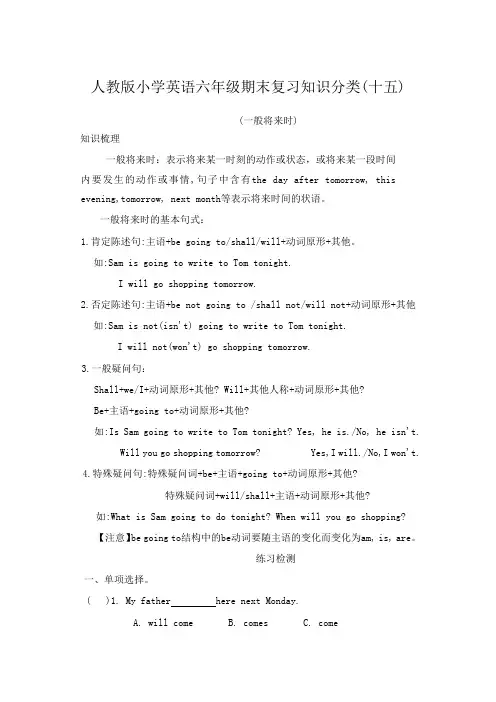
人教版小学英语六年级期末复习知识分类(十五)(一般将来时)知识梳理一般将来时:表示将来某一时刻的动作或状态,或将来某一段时间内要发生的动作或事情,句子中含有the day after tomorrow, this evening,tomorrow, next month等表示将来时间的状语。
一般将来时的基本句式:1.肯定陈述句:主语+be going to/shall/will+动词原形+其他。
如:Sam is going to write to Tom tonight.I will go shopping tomorrow.2.否定陈述句:主语+be not going to /shall not/will not+动词原形+其他如:Sam is not(isn't) going to write to Tom tonight.I will not(won't) go shopping tomorrow.3.一般疑问句:Shall+we/I+动词原形+其他? Will+其他人称+动词原形+其他?Be+主语+going to+动词原形+其他?如:Is Sam going to write to Tom tonight? Yes, he is./No, he isn't.Will you go shopping tomorrow? Yes,I will./No,I won't.4.特殊疑问句:特殊疑问词+be+主语+going to+动词原形+其他?特殊疑问词+will/shall+主语+动词原形+其他?如:What is Sam going to do tonight? When will you go shopping?【注意】be going to结构中的be动词要随主语的变化而变化为am, is, are。
练习检测一、单项选择。
( )1. My father here next Monday.A. will comeB. comesC. come( )2. How you there?A. are, going toB. is, going to getC. are, going to get( )3. he some reading tomorrow afternoon?A. Will,doesB. Is, going to doC. Is, doing ( )4. We are going to make some hamburgers .A. yesterdayB. last nightC. next weekend ( )5. you TV every day?A. Do, watchB. Are, watchingC. Did, watch ( )6. Look! The girls under the tree over there.A. readingB. are going to readC. are reading ( )7. My brother hard.A. studyB. studyingC. studies( )8. They will on the farm next Sunday.A. are going on a picnicB. go on a picnicC. going on a picnic二、用所给动词的适当形式填空。
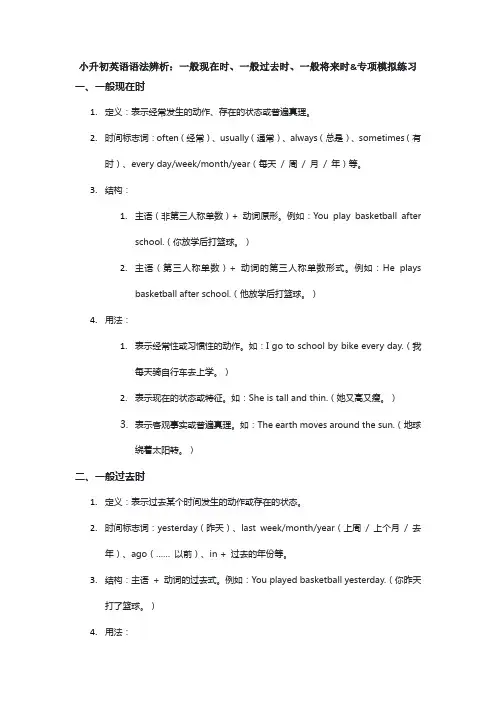
小升初英语语法辨析:一般现在时、一般过去时、一般将来时&专项模拟练习一、一般现在时1.定义:表示经常发生的动作、存在的状态或普遍真理。
2.时间标志词:often(经常)、usually(通常)、always(总是)、sometimes(有时)、every day/week/month/year(每天/ 周/ 月/ 年)等。
3.结构:1.主语(非第三人称单数)+ 动词原形。
例如:You play basketball afterschool.(你放学后打篮球。
)2.主语(第三人称单数)+ 动词的第三人称单数形式。
例如:He playsbasketball after school.(他放学后打篮球。
)4.用法:1.表示经常性或习惯性的动作。
如:I go to school by bike every day.(我每天骑自行车去上学。
)2.表示现在的状态或特征。
如:She is tall and thin.(她又高又瘦。
)3.表示客观事实或普遍真理。
如:The earth moves around the sun.(地球绕着太阳转。
)二、一般过去时1.定义:表示过去某个时间发生的动作或存在的状态。
2.时间标志词:yesterday(昨天)、last week/month/year(上周/ 上个月/ 去年)、ago(……以前)、in + 过去的年份等。
3.结构:主语+ 动词的过去式。
例如:You played basketball yesterday.(你昨天打了篮球。
)4.用法:1.表示过去某个时间发生的动作。
如:I went to the park last Sunday.(我上周日去了公园。
)2.表示过去存在的状态。
如:He was happy yesterday.(他昨天很开心。
)三、一般将来时1.定义:表示将来某个时间要发生的动作或存在的状态。
2.时间标志词:tomorrow(明天)、next week/month/year(下周/ 下个月/ 明年)、in the future(在未来)等。
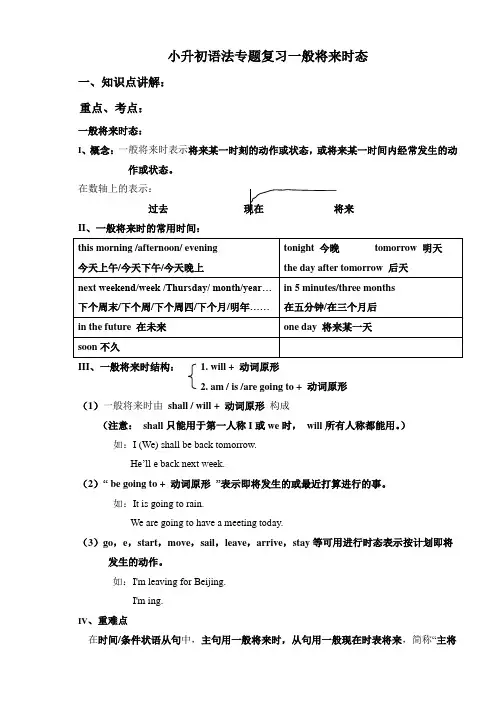
小升初语法专题复习一般将来时态一、知识点讲解:重点、考点:一般将来时态:I 、概念:一般将来时表示将来某一时刻的动作或状态,或将来某一时间内经常发生的动作或状态。
在数轴上的表示:过去现在 将来II 、一般将来时的常用时间:III 、一般将来时结构: 1. will + 动词原形2. am / is /are going to + 动词原形(1)一般将来时由 shall / will + 动词原形 构成(注意: shall 只能用于第一人称I 或we 时, will 所有人称都能用。
) 如:I (We) shall be back tomorrow.He’ll e back next week.(2)“ be going to + 动词原形 ”表示即将发生的或最近打算进行的事。
如:It is going to rain.We are going to have a meeting today.(3)go ,e ,start ,move ,sail ,leave ,arrive ,stay 等可用进行时态表示按计划即将发生的动作。
如:I'm leaving for Beijing.I'm ing.IV 、重难点在时间/条件状语从句中,主句用一般将来时,从句用一般现在时表将来,简称“主将从现”;常见的从句引导词为:when、if 、as soon as 等。
如:If it ________( not rain) tomorrow , we ________(go) to the park.I ________(be) a doctor when I ________(grow) up.I ________ (call) you as soon as he ________(e) back.V、一般将来时态与句型(**)(1)变为否定句:在be动词(am, is, are)后加not,或情态动词will后加not成won’t。
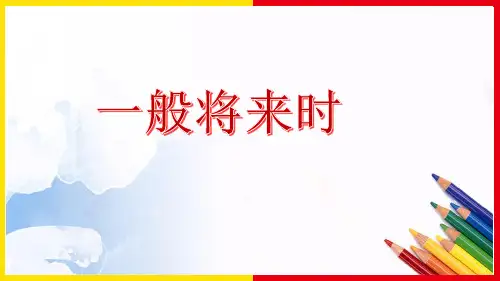

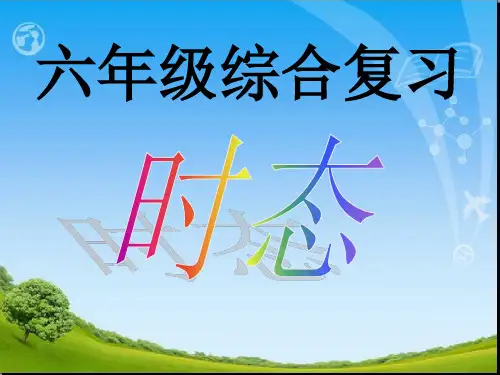
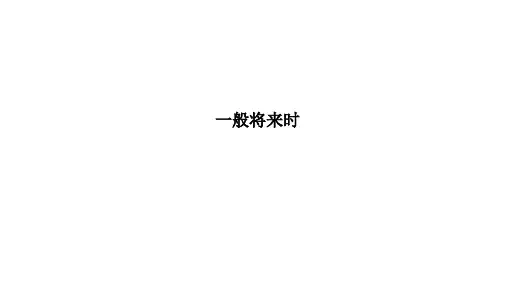
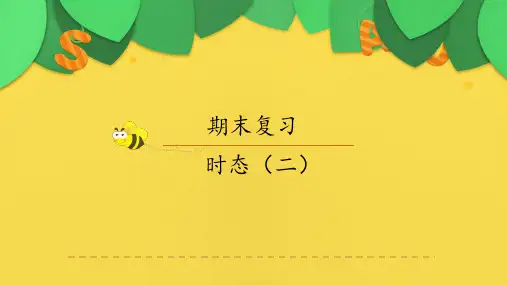
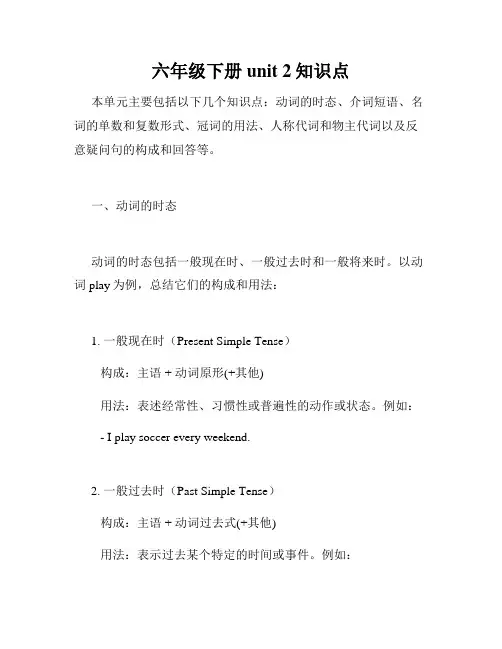
六年级下册unit 2知识点本单元主要包括以下几个知识点:动词的时态、介词短语、名词的单数和复数形式、冠词的用法、人称代词和物主代词以及反意疑问句的构成和回答等。
一、动词的时态动词的时态包括一般现在时、一般过去时和一般将来时。
以动词play为例,总结它们的构成和用法:1. 一般现在时(Present Simple Tense)构成:主语 + 动词原形(+其他)用法:表述经常性、习惯性或普遍性的动作或状态。
例如: - I play soccer every weekend.2. 一般过去时(Past Simple Tense)构成:主语 + 动词过去式(+其他)用法:表示过去某个特定的时间或事件。
例如:- She played tennis yesterday.3. 一般将来时(Future Simple Tense)构成:主语 + will + 动词原形(+其他)用法:表示将来发生的动作或状态。
例如:- They will play basketball tomorrow.二、介词短语介词短语在句子中作状语,用于修饰动词或形容词。
常见的介词短语有in front of、next to、on the left/right、under、behind等。
例如:- The book is on the table.三、名词的单数和复数形式1. 一般情况下,名词的复数形式在词尾加-s,例如:books、teachers、desks等。
2. 以s、x、sh、ch或o结尾的名词,在词尾加-es构成复数形式,例如:buses、boxes、brushes、watches等。
3. 以辅音字母+y结尾的名词,变y为i,再加-es构成复数形式,例如:ladies、berries、cities等。
4. 一些名词的复数形式不规则,例如:children、mice、feet等。
四、冠词的用法冠词分为定冠词(the)和不定冠词(a/an)。
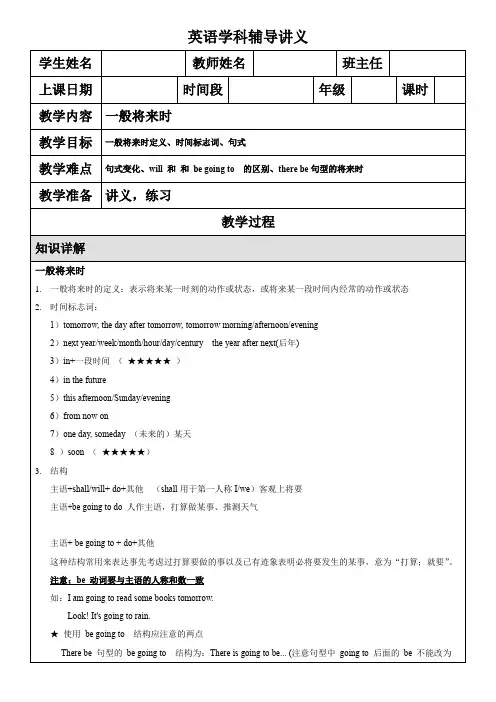
英语学科辅导讲义
一般将来时
1.一般将来时的定义:表示将来某一时刻的动作或状态,或将来某一段时间内经常的动作或状态
2.时间标志词:
1)tomorrow, the day after tomorrow, tomorrow morning/afternoon/evening
2)next year/week/month/hour/day/century the year after next(后年)
3)in+一段时间(★★★★★)
4)in the future
5)this afternoon/Sunday/evening
6)from now on
7)one day, someday (未来的)某天
8 )soon (★★★★★)
3.结构
主语+shall/will+ do+其他(shall用于第一人称I/we)客观上将要
主语+be going to do 人作主语,打算做某事、推测天气
主语+ be going to + do+其他
这种结构常用来表达事先考虑过打算要做的事以及已有迹象表明必将要发生的某事,意为“打算;就要”。
注意:be 动词要与主语的人称和数一致
如:I am going to read some books tomorrow.
Look! It's going to rain.
★使用be going to 结构应注意的两点
There be 句型的be going to 结构为:There is going to be... (注意句型中going to 后面的be 不能改为。
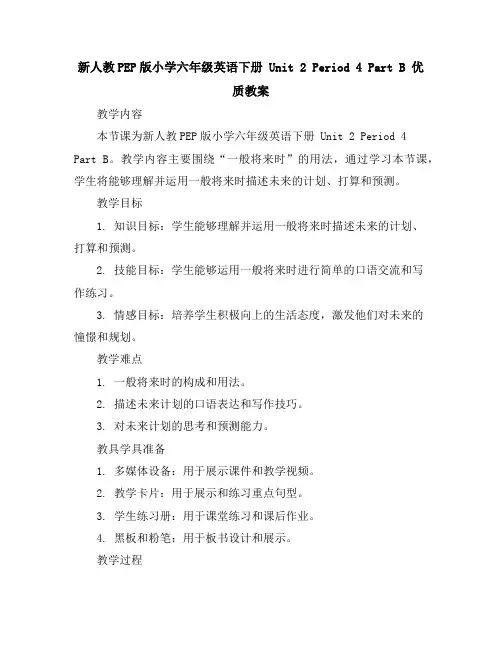
新人教PEP版小学六年级英语下册 Unit 2 Period 4 Part B 优质教案教学内容本节课为新人教PEP版小学六年级英语下册 Unit 2 Period 4Part B。
教学内容主要围绕“一般将来时”的用法,通过学习本节课,学生将能够理解并运用一般将来时描述未来的计划、打算和预测。
教学目标1. 知识目标:学生能够理解并运用一般将来时描述未来的计划、打算和预测。
2. 技能目标:学生能够运用一般将来时进行简单的口语交流和写作练习。
3. 情感目标:培养学生积极向上的生活态度,激发他们对未来的憧憬和规划。
教学难点1. 一般将来时的构成和用法。
2. 描述未来计划的口语表达和写作技巧。
3. 对未来计划的思考和预测能力。
教具学具准备1. 多媒体设备:用于展示课件和教学视频。
2. 教学卡片:用于展示和练习重点句型。
3. 学生练习册:用于课堂练习和课后作业。
4. 黑板和粉笔:用于板书设计和展示。
教学过程1. 导入:通过展示一张未来的城市规划图,引发学生对未来的思考和讨论,导入本节课的主题。
2. 呈现:通过多媒体展示一般将来时的构成和用法,讲解重点句型和语法规则。
3. 练习:学生通过听、说、读、写的练习,巩固一般将来时的用法和口语表达。
4. 应用:学生进行小组活动,讨论并分享自己的未来计划,运用一般将来时进行口语交流。
板书设计1. 新人教PEP版小学六年级英语下册 Unit 2 Period 4 Part B2. 重点句型:一般将来时的构成和用法。
3. 口语表达:描述未来计划的口语表达和写作技巧。
4. 练习和活动:学生练习和小组活动的安排。
作业设计1. 书面作业:学生完成练习册中与本节课相关的内容,巩固一般将来时的用法。
2. 口语作业:学生与家长或朋友进行口语交流,分享自己的未来计划,运用一般将来时进行表达。
课后反思本节课通过多媒体展示、口语练习和小组活动等多种教学手段,帮助学生理解和运用一般将来时描述未来的计划、打算和预测。
一般将来时定义:一般将来时表示在现在看来即将要发生的动作或存在的状态。
常用时间副词tomorrow, soon或短语next year / week / month, in a few days, in the future, sometime 做状语。
如:What will you do this afternoon?你今天下午干什么?We will have a meeting tomorrow. 我们明天要开会。
用法及构成:1.一般将来时的基本用法是表示单纯的将来事实,由“will + 动词原形”构成:①We will have a lot of rain next month. 下个月将下很多雨。
②I think she will pass the exam. 我想他考试会及格的。
2.用“be going to+动词原形”表示。
主要表示打算和预测:①We are not going to stay there long. 我们不准备在那里多待。
(表打算)②I’m afraid they’re going to lose the game. 恐怕他们会赛输。
(表预测)③Look, it’s going to rain. 瞧,要下雨了。
(表预见)练习题:( ) 1. There __________ a meeting tomorrow afternoon.A. will be going toB. will going to beC. is going to beD. will go to be( ) 2. Charlie ________ here next month.A.isn’t workingB. doesn’t workingC. isn’t going to workingD. won’t work ( ) 3. He ________ very busy this week, he ________ free next week.A. will be; isB. is; isC. will be; will beD. is; will be( ) 4. There ________ a dolphin show in the zoo tomorrow evening.A. wasB. is going to haveC. will haveD. is going to be ( ) 5. –_____ you _____ free tomorrow?– No. I ______ free the day after tomorrow.A. Are; going to; willB. Are; going to be; willC. Are; going to; will beD. Are; going to be; will be( )6. Mother ________ me a nice present on my next birthday.A.will givesB. will giveC. givesD. Give( )7. – Shall I buy a cup of tea for you?–________. (不,不要。
一般将来时专项训练(二)田墩中心小学何龙一、用括号中所给单词的适当形式填空。
1. I ________ (do) my homework tonight.2. We ________ (water) the flowers this afternoon.3. He ________ (buy) a CD next Saturday.4. You ________ (read) books on the weekend.5. They ________ (go) the cinema this evening.6. My parents ________ (fly) to Beijing tomorrow.7. Mike ________ (watch) TV this evening.8. Amy ________ (have) a busy weekend tomorrow.9. Lily ________ (read) books on Saturday morning.10. Tom and Jack ________ (watch) TV on Saturday afternoon.11. She ________ (go) shopping on Sunday morning.12. He ________ (play) football this afternoon.13. I ________ (go) hiking this afternoon.二、根据答句写问句。
1. _________________________________________?I am going to visit my grandparents this weekend.2. _________________________________________?He is going at 9:25.3. _________________________________________?They are going to the library tomorrow.4. ________________________________________?We are going to Shanghai by plane.5. _________________________________________?Mike is going to watch TV this evening.6. _________________________________________?Liu Yun is going to read books this Saturday.7. ________________________________________?John is going to the theme park this weekend.8. _________________________________________?Sarah is going to be an English teacher one day.三、选词填空。